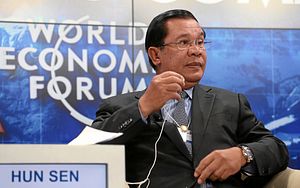Prime Minister Hun Sen and his ruling Cambodian People’s Party (CPP) will find out whether a strategy of cajoling and intimidation has shored up their support base when over seven million registered voters cast their ballots in commune elections on Sunday, June 4.
Rarely has their grip on power been so seriously challenged after changing demographics and a maturing post-war baby boom generation sharply reduced the CPP’s hold on power at general elections in 2013, causing a good deal of angst among the politically connected.
CPP-held seats fell from 90 to 68 in the 123-seat National Assembly after the nation’s youth, by and large, sided with the opposition Cambodian National Rescue Party (CNRP). The commune elections will act as a bellwether in regards to any further slide in the party’s popularity.
Commune elections are different from the national ballot, due in July next year. About 12,000 positions including commune chiefs and district counselors will be contested by 12 political parties in more than 14,073 villages organized into clusters of 1,641 communes.
Analysts say the key number to watch is the overall vote. In the 2012 commune election, the CPP won 60 percent of the vote compared to the 30.6 percent for the CNRP. The high number of parties in this poll could also split the CNRP vote.
Importantly, more than 70 percent of the country’s population is under the age of 30, a legacy of a post-war baby boom. They want better-paid jobs, smart phones, motorbikes, and the type of luxuries their parents could ill-afford.
They are a difficult brood for the CPP, which has maintained its recent hold on power by ending a three-decade war in 1998 and ensuring security and essential services that has helped deliver unparalleled economic benefits since then.
Bo Pao, an executive with Youth Education for Development and Peace, told The Diplomat Cambodia’s youth would leave their mark at this election, adding they were better educated than their parents and had different needs. But he also added that “for the election to be free and fair, the government should stop warning about the outbreak of war, if their party does not win.”
Like most Cambodian elections, the lead-up to this poll has been far from clean. Hun Sen has persistently warned that an opposition victory would result in a return to civil war but has declined to say who will do the fighting. The CPP firmly controls the Cambodian military.
The government has also silenced dissent through defamation laws. Opposition supporters and parliamentarians have been jailed as a result, their political lives made harder by further laws banning people with a conviction from holding public office.
That forced the popular opposition leader Sam Rainsy, who had fled back into self-imposed exile in France, into an early retirement, with his former deputy Kem Sokha now in charge.
Two opposition politicians have also been bashed on the steps of the National Assembly, while journalists have been singled out and bullied. The killing of political commentator Kem Ley in mid-2016 has quelled criticism of the CPP, which has been in power since 1979.
Senior CPP figures, including Hun Sen, insist they are not conducting a dirty tricks campaign, that they are not responsible for any of the violence, and that CNRP supporters currently before the courts are there because they broke the law.
“We don’t crack down because of their politics,” government spokesman Phay Siphan told The Diplomat. “Those people committed crimes against the law and they have to respect Cambodian law; they have to respect the court.”
Meanwhile, CNRP veteran Son Chhay says he is hoping for a peaceful election with the opposition winning “lots” of positions. Others are also hopeful the election and the final week of campaigning will pass off without incident.
If not, then Cambodia risks returning to the cycles of electoral violence that once made this country notorious, economic growth impossible, and the outlook for the nation’s youth particularly gloomy.
Luke Hunt can be followed on Twitter @lukeanthontyhunt






























